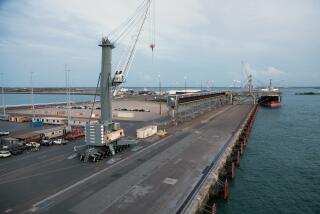A WORLD REPORT SPECIAL EDITION ON THE PACIFIC RIM : THE SOUTH RIM : Companies : Deregulation Spurs Growth in Exports
- Share via
The streamlining of New Zealand and Australian businesses in the past decade stretched from basic industry to family firms, but in almost every case it was spurred by government policies designed to strip away protective barriers and aim for the export market. Some examples:
Fisher & Paykel
One of the biggest winners from New Zealand’s financial deregulation is 60-year-old Fisher & Paykel, a manufacturer of home appliances.
While New Zealand businesses spent decades protected from the competition of foreign goods by a wall of tariff barriers, the Auckland firm manufactured appliances under license from foreign companies. The national policy then was to substitute a New Zealand manufactured good for a foreign product, no matter what the quality or the cost.
A 1983 agreement with Australia changed all that. Import duties on Australian-made goods were removed, and Fisher & Paykel found it had competition for washers, dryers and refrigerators. As import duties were gradually stripped away, competition heated up.
Richard Blundell, the company’s general manager for corporate affairs, said the key to survival was coming up with production lines that let the company make products for small, niche markets and overseas trade.
The result has been impressive growth. Fisher & Paykel controls 20% of the Australian market in home appliances. It sells more freezers in Japan than in Australia and New Zealand combined. Blundell said 55% of the company’s manufactured goods are now exported, with two-thirds heading for Australia and one-third for Asia.
“What we specialize in,” he said, “are very small runs, which are too small for bigger companies to bother with. But they are a nice, profitable niche for us.”
The company earned an $18-million profit (U.S. dollars) last year on revenues of $455 million.
Holden Engine Co.
One of the industries hardest hit by Australia’s deregulation in the 1980s was the car industry. Protected by prohibitive taxes on imports, companies manufactured solely for the Australian market.
When deregulation came, the industry shed 40,000 jobs, closing plants in areas no longer profitable and introducing improvements in technology.
Holden Engine Co., a subsidiary of General Motors Inc., not only survived the shakeout but is thriving these days. The company makes four-cylinder engines for small cars.
“We certainly have been successful exporting our production. The trend is to increasing volumes and they all go to Asia,” Peter Thomas, Holden’s managing director, said.
The company’s largest Asian client is South Korea, where the engines are used in Korean-brand cars. They also sell in Indonesia and South Africa.
“Our competitiveness has markedly improved since the restrictions were lifted,” the Holden executive said, adding that two-thirds of the company’s production is sent overseas, accounting for 52% of earnings.
Cheesecake Factory
Recent surveys show that small- and medium-sized companies in Australia are the firms that are cashing in on the country’s export boom. But would you believe a niche market in cheesecake? A Melbourne company called the Cheesecake Factory has won a deal with Japan’s largest fast-food chains to provide cheesecake. Managing Director Diarmuid Hannigan is pleased with the deal, but he admits it has been “a very, very hard slog.”
“When you’re dealing with the Japanese market, you’re always ironing out problems,” Hannigan said. “They are always demanding more and more of their manufacturers.”
For Hannigan, the problem was the color of the cheesecake. Unlike the variety found in the United States, Japanese cheesecakes are not cooked. Hannigan was given the recipe for the cake by the fast-food chain, which balked when the first shipment came back with a deep-brown topping. They insisted on light brown, Hannigan said.
“It’s their mind-set that’s the crucial issue. For a Westerner it can be very difficult to understand. But if you can get established in that market there is a huge opportunity.”
The company has increased its work force from 12 bakers to 30 and now has sales of $2.25 million.
Lend Lease Corp.
Lend Lease Corporation Ltd., Australia’s largest property and financial services group, boasting a record of 20 years of constantly rising profit rates, has plunged into the embryonic financial services market in neighboring Indonesia, pursuing a corporate strategy of “duplicating” its Australian operations in Asia.
Last year, Lend Lease formed a joint venture with Sinar Mas, Indonesia’s third largest corporation, to exploit the growing enthusiasm for pension plans among the Indonesian middle class in both the public and private sectors.
The pension fund market was expected to grow from virtually zero last year to $1.12 billion in the next three to five years, Lynette Mayne, Lend Lease’s chief executive for corporate financial services told the Australian Financial Review when the joint venture was announced.
Other Australian corporations such as AMP (Australian Mutual Provident) and National Mutual were already active in Indonesia. The main foreign competitors in financial management services in Indonesia are U.S. and Japanese banks.
“Australia is still 90% of our business,” Lend Lease Chairman Stuart Hornery said in December when he was named “Businessman of the Year” by the Australian Business Monthly magazine. “I don’t want to reach the year 2000 and find that we are still dependent on the Australian market,” he said, adding that these days he spends a lot of his time in “what I call missionary work in Asia.”
More to Read
Inside the business of entertainment
The Wide Shot brings you news, analysis and insights on everything from streaming wars to production — and what it all means for the future.
You may occasionally receive promotional content from the Los Angeles Times.










